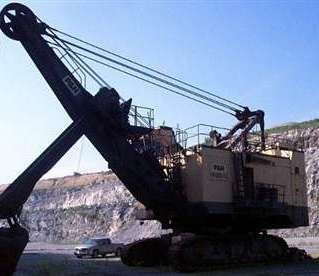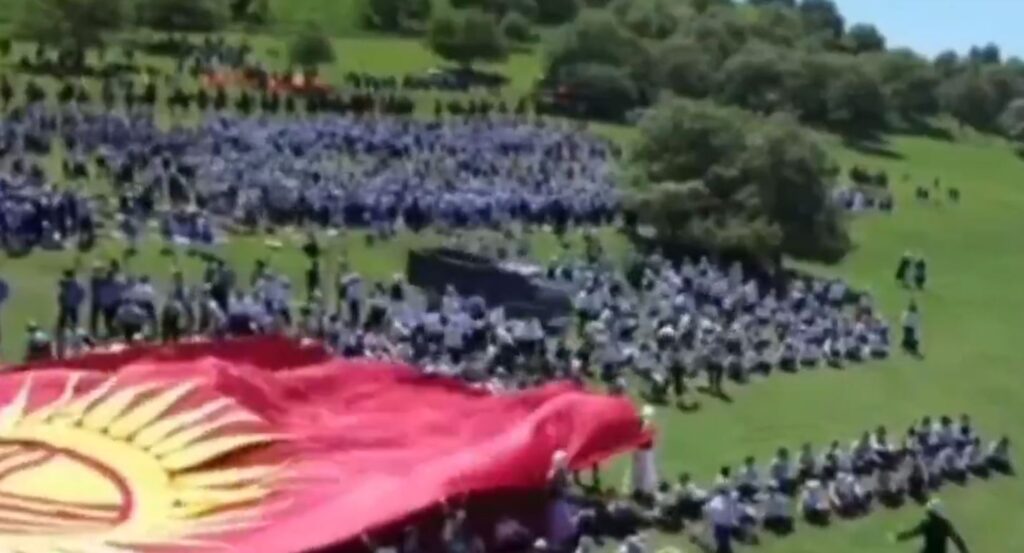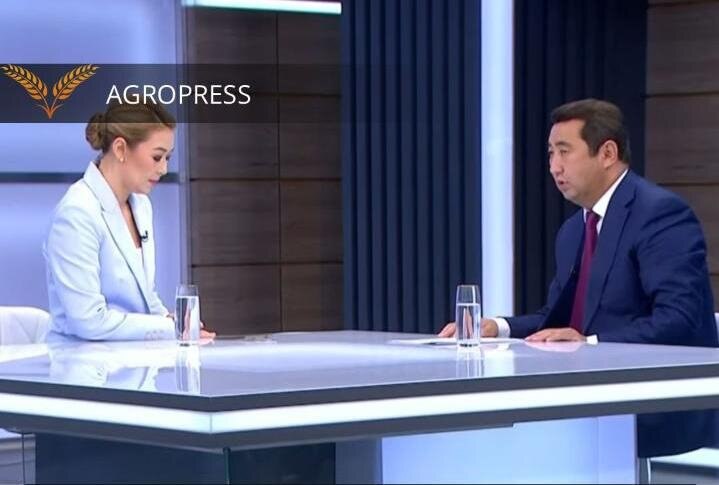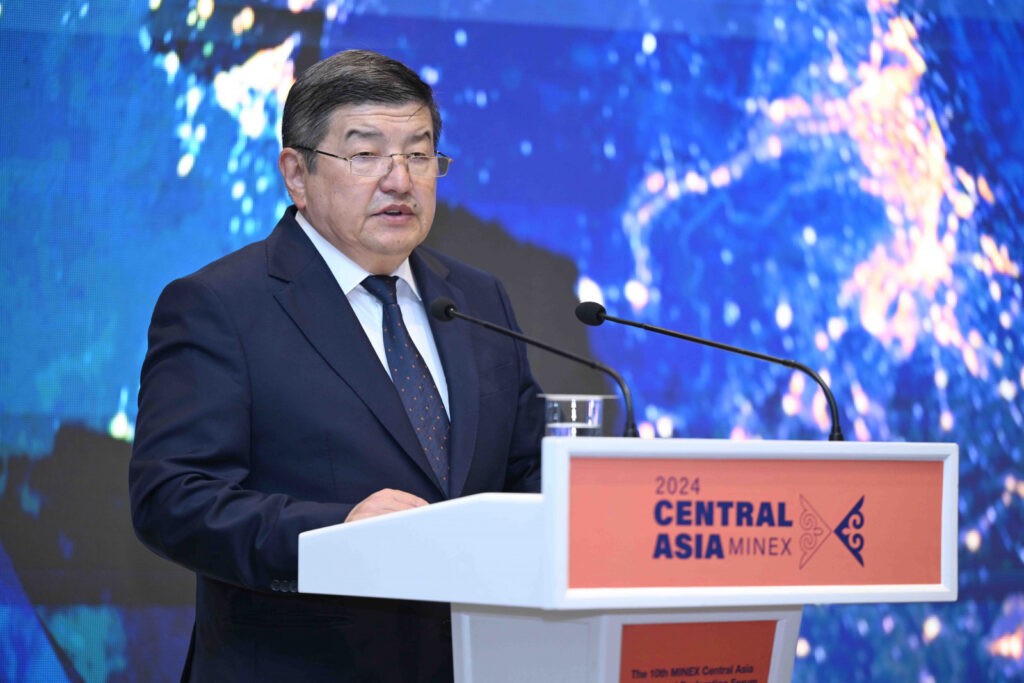BISHKEK (TCA) — A special commission conducted laboratory examinations on the loss of livestock at Solton-Sary, First Deputy Prime Minister of Kyrgyzstan Kubatbek Boronov said during his meeting with local residents at the Solton-Sary gold field in the Naryn oblast on July 25.
No harm to environment revealed
There are some violations in the work of the Jhong ji Mining Chinese company, which has a license to develop the deposit, and deficiencies will soon be corrected, he said.
Some local residents associated the company’s activities with recent livestock deaths.
“Most importantly, the company’s activities do not harm the health of people and the environment. The company will conduct its work according to the laws of our country. We will take these issues under control,” Boronov said.
“According to the results of inspections, 66% of livestock died due to parasitic diseases of lungs, liver and intestines because livestock vaccination had not been fully implemented. This situation is observed in other places. If farmers do not carry out vaccination, there will be more cases of death of cattle,” said Kalys Jumakanov, head of the State Inspectorate for Veterinary and Phytosanitary Control under the Government.
Analysis of water and soil found no traces of cyanide there, the head of the State Sanitary and Epidemiological Service, Tolonbai Isakov, said. The radiation at the Solton-Sary deposit and nearby jailoo (mountain pastures) complies with the standards, he added.
Local residents were also informed that the Chinese company will change the frequency of blasting operations, and these works will be carried out under the new system.
Speaking about the Government’s work on attracting foreign investment, First Deputy Prime Minister Boronov stressed that if every time local residents demand to close down enterprises, there will be a problem with investments and the socio-economic development of the country.
If a company conducts its activities within the law and complies with all environmental standards, it is necessary to give it an opportunity to work in our country, Boronov said.
He ordered to create a civilian group to monitor the elimination of flaws identified during the inspection. The group will include residents of nearby villages and representatives of the State Inspectorate for Environmental and Technical Safety.
Background
Earlier this month, a new wave of protests against foreign investors began in Kyrgyzstan. At the Solton-Sary gold deposit, local residents demanded to stop the activities of the Chinese company, Jhong ji Mining.
On July 15, at a rally near the regional administration building, residents of three villages of the Naryn oblast demanded that the authorities close the Solton-Sary gold mine, which is being developed by Jhong ji Mining.
According to the Naryn oblast’s administration, residents of Emgekchil, Min-Bulak and On-Archa villages claimed that a large number of livestock died because of gold mining operations.
“They also complained of frequent explosions in the field. They said that 29 animals died, and the district veterinary inspection identified arsenic and nitrate in their carcasses.”
If the commission finds out that the livestock of the residents had died due to blasting at the field, the Chinese company should compensate them for the damage, Aziz Kasenov, the First Deputy Plenipotentiary of the Government in the Naryn oblast told Sputnik.kg.
Initially, local residents demanded only compensation for the dead animals, but on the third day the protesters began to make political statements demanding to expel the Chinese. The local administration hurried to report that the work at the Solton-Sary field was terminated until the circumstances were clarified.
This was not the first requirement of local residents to close the gold mining enterprise in Solton-Sary. In May 2018, residents of Emgekchil village also opposed mining operations. They claimed that wastes fall into the river water which they draw for personal use and drinking.
Jhong ji Mining received a license to mine gold at Solton-Sary in 2012. According to forecasts, the total gold reserves are about 20 tons. The company provides jobs for about 160 local residents.
Rocking the boat?
Meanwhile, no one tried to find out why out of two thousand sheep grazing in those places, only 29 sheep died owned by a single shepherd.
In the social networks there were photos and videos in which the authors claimed that the livestock of local residents was dying due to the fact that the Chinese gold mining company pollutes the water in the river from which animals drink.
Moreover, shortly after the news of the livestock death, stiff anti-Chinese appeals appeared on social networks.
It seems that someone purposely tried to rock the international boat using the example of one single investor and building a provocation, although the dispute could be easily resolved by measures prescribed by law, experts believe. Many ordinary citizens do not understand the intricacies of politics, and allow politicians to manipulate their public consciousness.
The moves aimed to discredit the current Government and its adequacy in building relations with neighbors and political partners, political scientist Sheradil Baktygulov told VB.kg.
It is a dangerous situation, because many people do not understand this, continuing, by inertia, to be an instrument of geopolitical struggle, Baktygulov concluded.
Causes of conflicts
The main cause of conflicts between local communities and subsoil users is environmental impact, researcher Dinara Musabekova said at a press-conference in Bishkek.
In a recent study, the situation was updated with the help of focus groups, since the previous study on the causes of conflicts was conducted in 2014.
The study covered six local communities in the Issyk-Kul and Jalal-Abad oblasts, where gold deposits are located.
The main cause of conflicts is environmental impact. There is an information vacuum, when people do not understand what changes have been made to mitigate conflicts, Musabekova said.
There are no local development programs in the surveyed regions. Villagers complained that goods are purchased in Bishkek but not at the local markets. The quota system is violated during employment, they said. A lot of complaints were about the noise during blasting and pasture degradation.
Reclamation problems
There are problems in the legislation on land reclamation in the mining industry, since each side has its own vision, the State Committee for Industry, Energy and Subsoil Use of the Kyrgyz Republic said.
Over the past three years, no studies have been carried out, either private or public, on the reclamation of disturbed land after mining. The country faces such acute problems as land degradation, soil pollution with heavy metals, use of old technologies and low level of expertise.
In the use of the reclamation law, Kyrgyzstan is still in transition.
Along with new national legislative acts, the country still uses old Soviet ones. Since Kyrgyzstan entered the Eurasian Economic Union, it has to bring its legislation in accordance with the EEU rules and eliminate the gaps in the reclamation legislation, Guljan Makhmudova, expert of the State Committee for Industry and Subsoil Use, said.
There are three main legislative acts on land reclamation in Kyrgyzstan’s mining industry — the Land Code, the Law on the Subsoil, and Government regulation of land reclamation which consists of only five pages, without guidance and instructions. For the past years, two minor changes were made in the land reclamation regulations.
Make investors stay
The Socio-Economic Development Forecast of the Kyrgyz Republic for 2020-2022 identified the main risks of investment unattractiveness of the country. These are the unpredictability of the business environment (conflicts of the local population with investors, backward technologies, low profitability, and difficulties in the allocation of land for subsoil use) and the late input of planned fields.
“It is easier to persuade investors to come to our country but it is very difficult to protect them here,” said Almaz Isanov, expert of the Investment Promotion and Protection Agency of Kyrgyzstan.
It is necessary to assess the impact of projects on the environment and to determine the social effects. Many Chinese companies want to enter Kyrgyzstan’s mining sector but disagreements with the population often occur.
The Agency is developing an interactive map that will include all current and future investment projects, and the local community is engaged to discuss risks that may arise with the arrival of investors.
Kyrgyzstan lacks the capacity to independently develop the mining industry, so it is in dire need of foreign direct investment. But investment projects may be postponed or canceled due to the lack of proper conditions, independent expert Kuban Ashyrkulov said.
The decline in foreign investment by 30% last year alarmed not only the Government but also all experts who began to doubt the correctness of the state policy. If the country continues to change the laws and conditions for investors, long-term investments will not come.
The Kyrgyz Government and investors should act together, experts believe. The Government should ensure safe conditions for the business which creates jobs and manages investments. If the Government intervenes in the management, the system will be disrupted, which would not be good for businesses.









